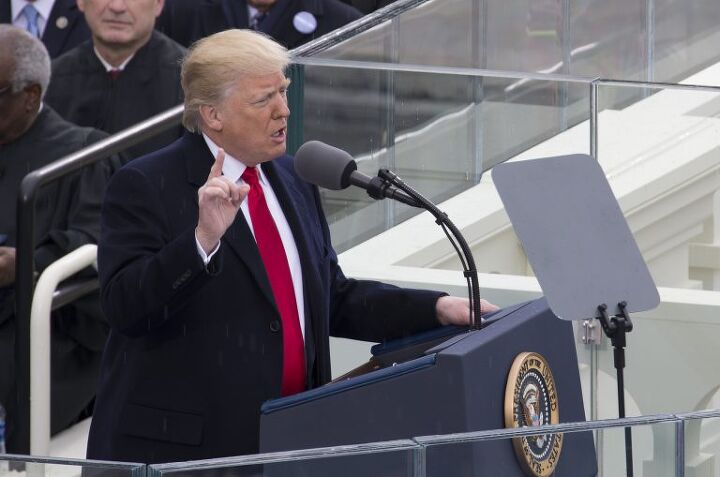Trump Proposes 20-percent Tax on Mexican Goods to Pay for Wall; Other Countries Could Take a Hit

Consumer products and vehicles produced outside of the U.S. could see a big hike in sticker price if the Trump administration goes ahead with a proposed plan to tax Mexican goods — and eventually all foreign goods — to the tune of 20 percent.
The White House said today the measure is being looked at as part of a wide-ranging tax overhaul package under consideration by Congress. The announcement came after an anticipated visit by Mexican President Enrique Pena Nieto went south.
The meeting between Trump and Nieto, scheduled for next week, fell apart today, with the Mexican leader taking to Twitter to announce the update. Of course, Nieto’s tweet came after one fired off by Trump, where he said the meeting should probably not go ahead if Mexico isn’t willing to pay for the administration’s proposed border wall.
Earlier this week, Trump pulled the U.S. out of the fledgling Trans-Pacific Partnership and announced his intention to renegotiate the North American Free Trade Agreement. The president has clearly expressed his desire to reach bilateral deals with individual nations. Mexico sends 80 percent of its goods to the U.S.
“I’ve said many times that the American people will not pay for the wall,” Trump said after the visit’s cancellation. “Unless Mexico is going to treat the United States fairly, with respect, such a meeting would be fruitless and I want to go a different route.”
Yesterday, Trump signed an executive order to begin construction of the wall — a key election plank proposed as a method of stemming illegal immigration. Nieto tweeted that his country is still hoping to reach a trade agreements “that favor both nations.”
White House spokesman Sean Spicer said the import tax is one of a range of options for paying for the wall, and it could eventually be applied to other nations. He added the tax could be targeted at specific industries.
Even if the 20-percent import tax was only applied to Mexican-made goods, it would still cause a shakeup in automakers’ production plans. Car manufacturers, both domestic and foreign, move production of low-profit vehicles south of the border to avoid the expense of opening costly assembly American plants to serve the U.S. market. Earlier this week, Trump proposed decreasing corporate tax rates to between 15 and 20 percent.
While Mexico and other countries stare down the barrel of a serious economic disruption, Canada, on the other hand, could make out like a bandit — assuming that country’s free-trade agreement with the U.S. stays intact.
After Trump pledged to reopen NAFTA, the head of his business advisory panel said that Canada shouldn’t worry about collateral damage.
“Canada is very well-positioned for any discussions with the United States,” said Stephen Schwarzman, adding that the U.S. holds its northern neighbor in “very high regard.” Canada sends 75 percent of its goods to the U.S., including vehicles produced by the Detroit Three, Honda and Toyota.
[Source: Reuters, Business Insider]

More by Steph Willems
Latest Car Reviews
Read moreLatest Product Reviews
Read moreRecent Comments
- Honda1 Unions were needed back in the early days, not needed know. There are plenty of rules and regulations and government agencies that keep companies in line. It's just a money grad and nothing more. Fain is a punk!
- 1995 SC If the necessary number of employees vote to unionize then yes, they should be unionized. That's how it works.
- Sobhuza Trooper That Dave Thomas fella sounds like the kind of twit who is oh-so-quick to tell us how easy and fun the bus is for any and all of your personal transportation needs. The time to get to and from the bus stop is never a concern. The time waiting for the bus is never a concern. The time waiting for a connection (if there is one) is never a concern. The weather is never a concern. Whatever you might be carrying or intend to purchase is never a concern. Nope, Boo Cars! Yeah Buses! Buses rule!Needless to say, these twits don't actual take the damn bus.
- MaintenanceCosts Nobody here seems to acknowledge that there are multiple use cases for cars.Some people spend all their time driving all over the country and need every mile and minute of time savings. ICE cars are better for them right now.Some people only drive locally and fly when they travel. For them, there's probably a range number that works, and they don't really need more. For the uses for which we use our EV, that would be around 150 miles. The other thing about a low range requirement is it can make 120V charging viable. If you don't drive more than an average of about 40 miles/day, you can probably get enough electrons through a wall outlet. We spent over two years charging our Bolt only through 120V, while our house was getting rebuilt, and never had an issue.Those are extremes. There are all sorts of use cases in between, which probably represent the majority of drivers. For some users, what's needed is more range. But I think for most users, what's needed is better charging. Retrofit apartment garages like Tim's with 240V outlets at every spot. Install more L3 chargers in supermarket parking lots and alongside gas stations. Make chargers that work like Tesla Superchargers as ubiquitous as gas stations, and EV charging will not be an issue for most users.
- MaintenanceCosts I don't have an opinion on whether any one plant unionizing is the right answer, but the employees sure need to have the right to organize. Unions or the credible threat of unionization are the only thing, history has proven, that can keep employers honest. Without it, we've seen over and over, the employers have complete power over the workers and feel free to exploit the workers however they see fit. (And don't tell me "oh, the workers can just leave" - in an oligopolistic industry, working conditions quickly converge, and there's not another employer right around the corner.)































Comments
Join the conversation
CallMeDick Trump just makes up shit as he goes along and and expects people to believe him. Apparently you are one of them
I used to buy MANN filters for most of my cars. A couple of year ago I installed a MANN air filter in my car and was very surprised to see that it did not fit quite right. Checking it over, I was further surprised that the filter was no longer Made in Germany. It was now Made in Mexico. What do I care where it is made, as long as it is made well, right? Being Made in Mexico did not make the price go down, by the way, not one penny. Well, I thought, it is still MANN, one crooked filter does not mean anything. Next time my Made in Mexico air filter did not fit right again. This time I was furious. I no longer buy MANN filters. Hengst filters I now buy are perfectly made and don't cost more than MANN filters. Made in Germany/Austria... I hope they do impose the 20% tax so that MANN filters come from Germany again.